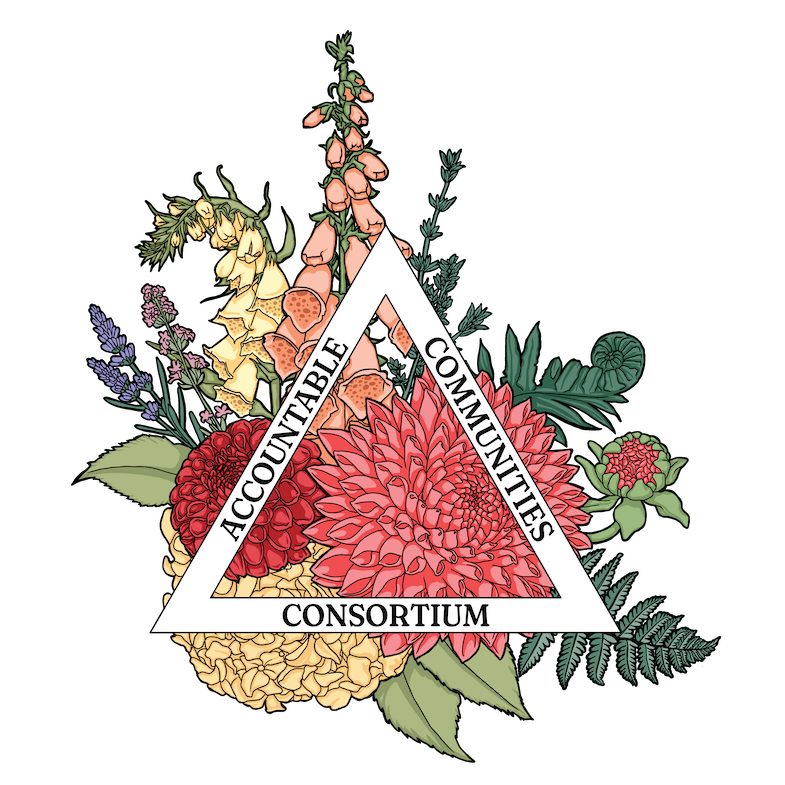Go-to Accountable Communities Resources:
Accountability
Fumbling Towards Repair
Fumbling Toward Repair is a workbook by Mariame Kaba and Shira Hassan that includes reflection questions, skill assessments, facilitation tips, helpful definitions, activities, and hard-learned lessons intended to support people who have taken on the coordination and facilitation of formal community accountability processes to address interpersonal harm & violence.
The Four Parts of Accountability & How To Give A Genuine Apology
By Mia Mingus-Four Parts to Accountability: self reflection, apology, repair, changed behavior. “True accountability is not only apologizing, understanding the impacts your actions have caused on yourself and others, making amends or reparations to the harmed parties; but most importantly, true accountability is changing your behavior so that the harm, violence, abuse does not happen again.”- Mia Mingus
Barnard Accountable Communities Series
Accountability is a familiar buzz-word in contemporary social movements, but what does it mean? How do we work toward it? In this series of four short videos, anti-violence activists Kiyomi Fujikawa and Shannon Perez-Darby ask and explore: What does it look like to be accountable to survivors without exiling or disposing those who do harm?
Accountability Mapping
Building our collective capacity for accountability in a transformative way. Includes the Centered Accountable Course and individual coaching led by Daria.
Transformative Justice
Popaganda Podcast- Come for the pop culture, stay for the abolition
Do you love reality television, true crime, memes, TikTok and all other forms of pop culture? Are you also interested in communal care outside of harmful state systems? Do you struggle to reconcile the two? Join Tashmica Torok and Shannon Perez-Darby on Popaganda, as we dive deep into our love of transformative justice, pop culture and where the two meet.
Building Your Abolitionist Toolbox
In collaboration, Interrupting Criminalization and Project Nia have compiled the 2020 resources from Project Nia's "Building Your Abolitionist Toolbox: Everyday Resources for a Punishment-Free World" series. This series explores skills that help community members engage and expand in self-accountability, restorative and transformative justice — building blocks of many community-based safety strategies. Together we explore tools and strategies that we can use right now — at home, in classrooms, at work, and in our neighborhoods.
Project Nia
Project Nia—“nia” meaning “with purpose” in Swahili—is a grassroots organization that works to end the arrest, detention, and incarceration of children and young adults by promoting restorative and transformative justice practices.
Bay Area Transformative Justice Collective
The Bay Area Transformative Justice Collective (BATJC) is a community collective of individuals, based out of Oakland, CA that is working to build and support transformative justice responses to child sexual abuse.
Survived and Punished
Survived & Punished is a prison abolition organization that believes that prisons, detention centers, all forms of law enforcement, and punitive prosecution are rooted in systems of violence, including racial, anti-trans/queer, sexual, and domestic violence. Their work specifically focuses on criminalized survivors to raise awareness about the integrated relationship between systems of punishment and the pervasiveness of gender violence. They aim to initiate mass defense projects that will free all survivors, which would require the abolition of prisons and other systems of punishment.
One Million Experiments
Explore snapshots of community-based safety strategies that expand our ideas about what keeps us safe.
Conflict
Turning Towards Each Other: A Conflict Workbook
From the authors: To get free, we need ways to navigate the hard parts involved in working with others as we build a world rooted in interdependence, regeneration, and justice.“So what do we do when we inevitably run into conflict?” This was the question on our minds when we wrote a new conflict workbook for groups working towards a shared purpose.
In it Together: A Framework for Conflict Transformation In Movement-Building Groups
Explore the tools and resources that support the use of human-centered, non-punitive accountability practices in movement spaces.
SO YOU’RE READY TO CHOOSE LOVE – Free Conflict Resolution Workbook
From Kai Cheng Thom: “This free digital (and printable) conflict resolution workbook is intended as a gift and humble offering to anyone looking for trauma-informed, anti-oppressive conflict resolution resources. While SO YOU’RE READY TO CHOOSE LOVE is self-published in the tradition of queer zines and open source knowledge sharing, it is in many ways a practical companion to my more anecdotal/theoretical essay collection, I HOPE WE CHOOSE LOVE, which is distributed for purchase through the wonderful Arsenal Pulp Press.”
Tools for Addressing Chapter Conflict- Prepared by Prentis Hemphill with support from the BLM Healing Justice Working Group
“When we understand the nature of conflict we can also understand that conflict between us, in our chapters, and within our network is an expected and common
issue. Though many different ways of interacting often get conflated under the word conflict, we want to be clear on what conflict is and distinguish it also from violence
and abuse, which we will talk about more in depth in a later tool.”
Infrastructure
Money-Handling and Taxes for Mutual Aid Groups
This online teach-in is for mutual aid groups facing nuts and bolts issues that come with the work we’ve all been doing. How has your group been funneling money to people in need, and what are the tax consequences? How should we store money we raise? Do we need to consider incorporating, having a fiscal sponsor, or becoming a non-profit? What are the costs and benefits of each potential approach? What should we do now if we didn’t think about this in 2020 and now one of our members got a big tax bill because they took in all the money through their personal Venmo or Paypal account? What should mutual aid groups know about banking?
